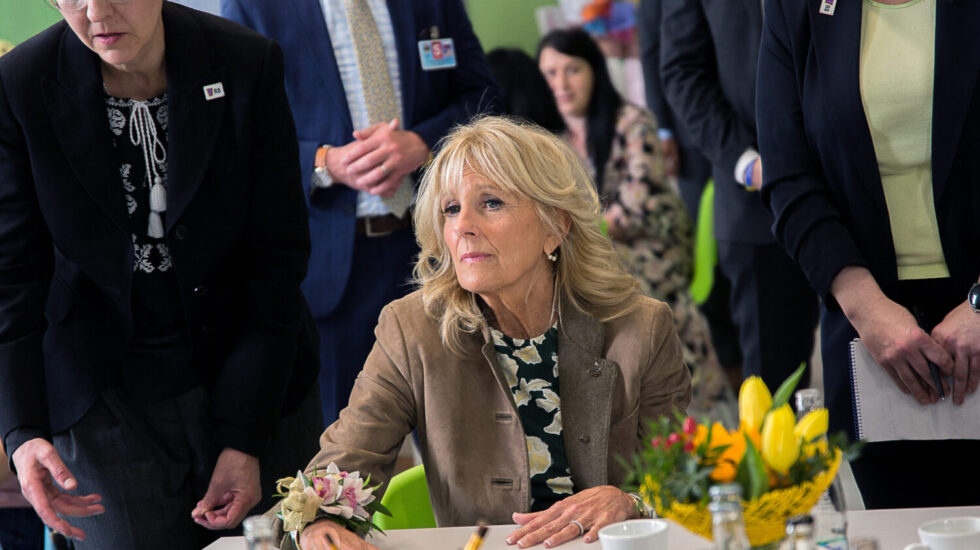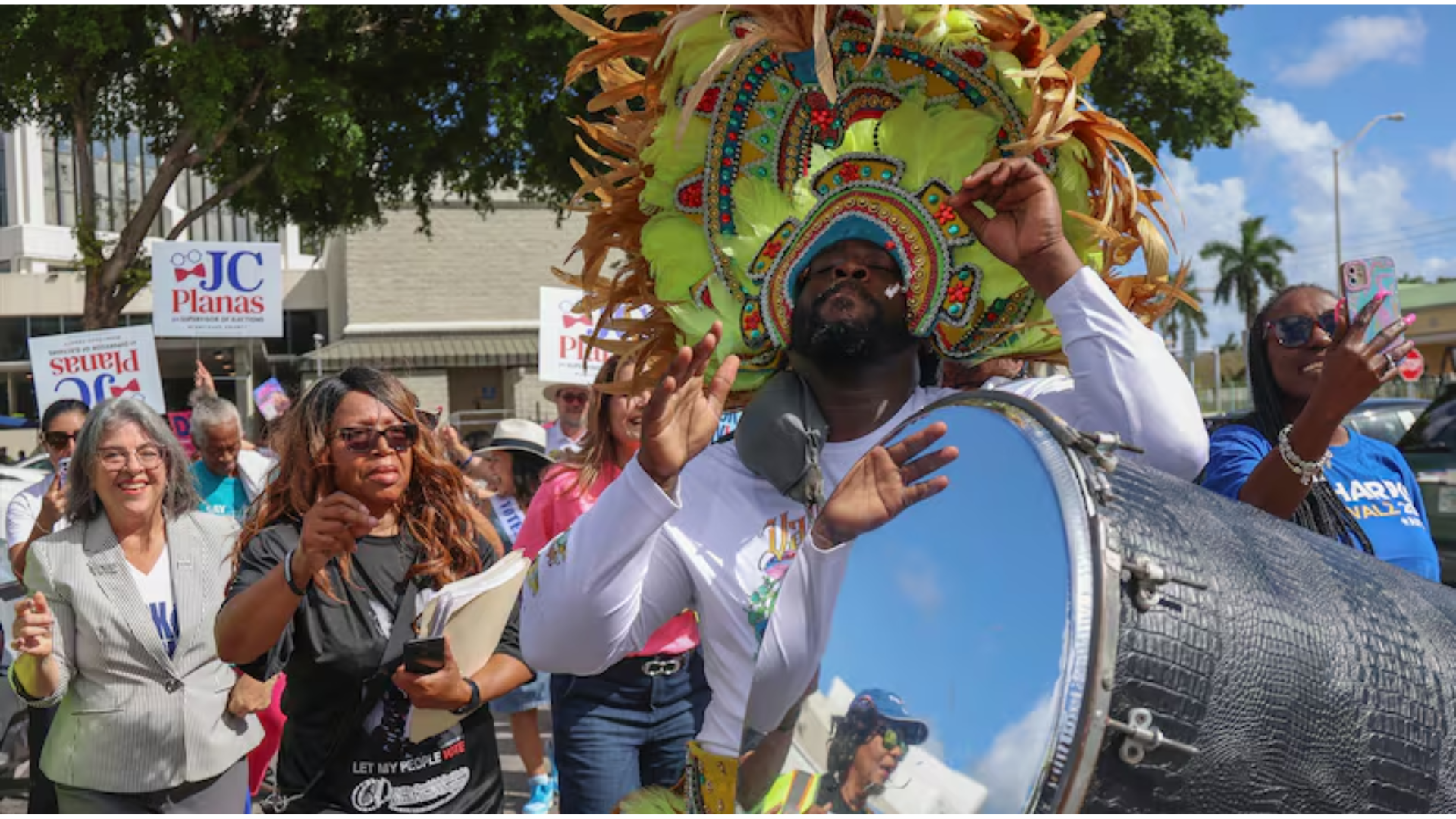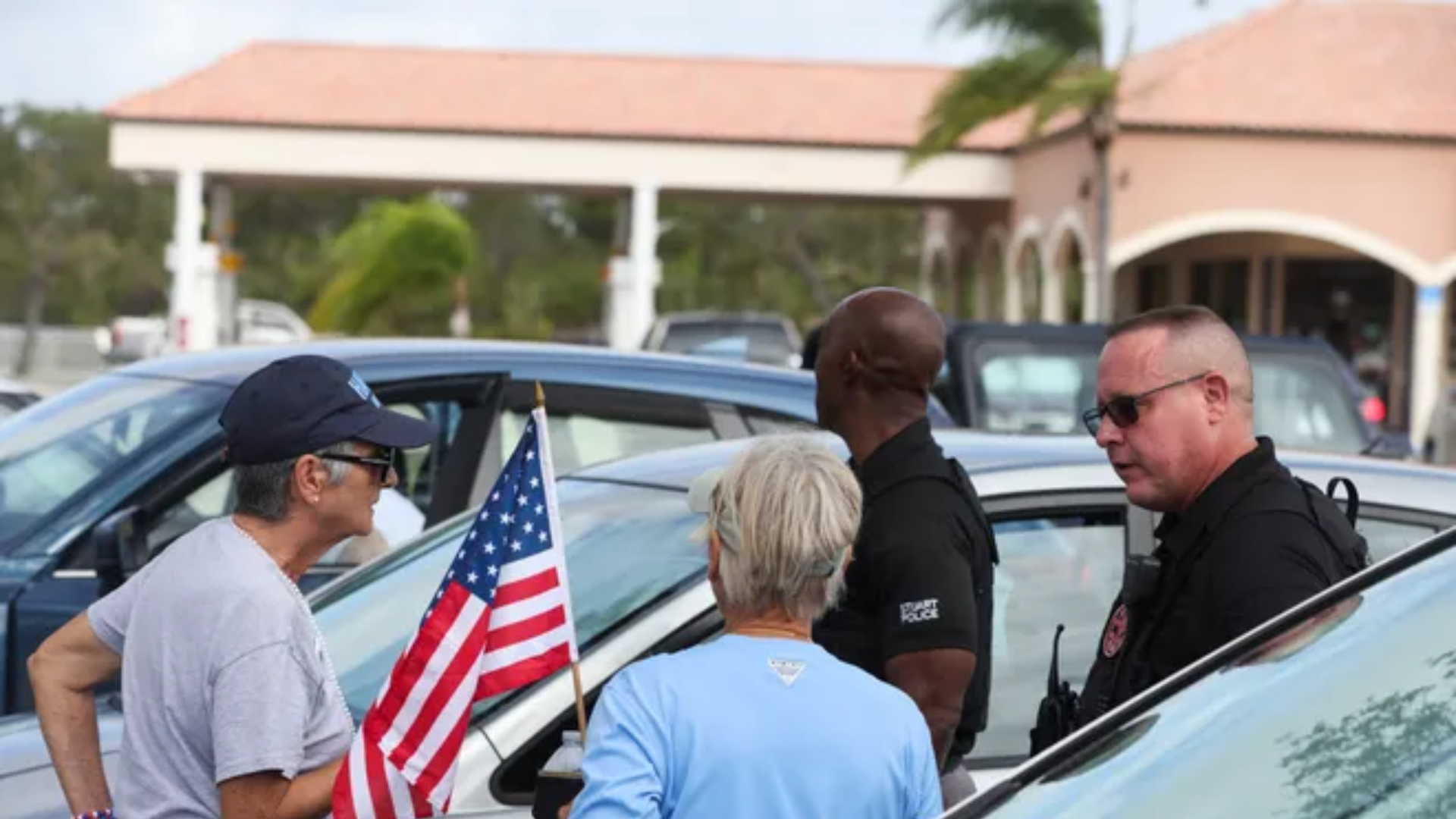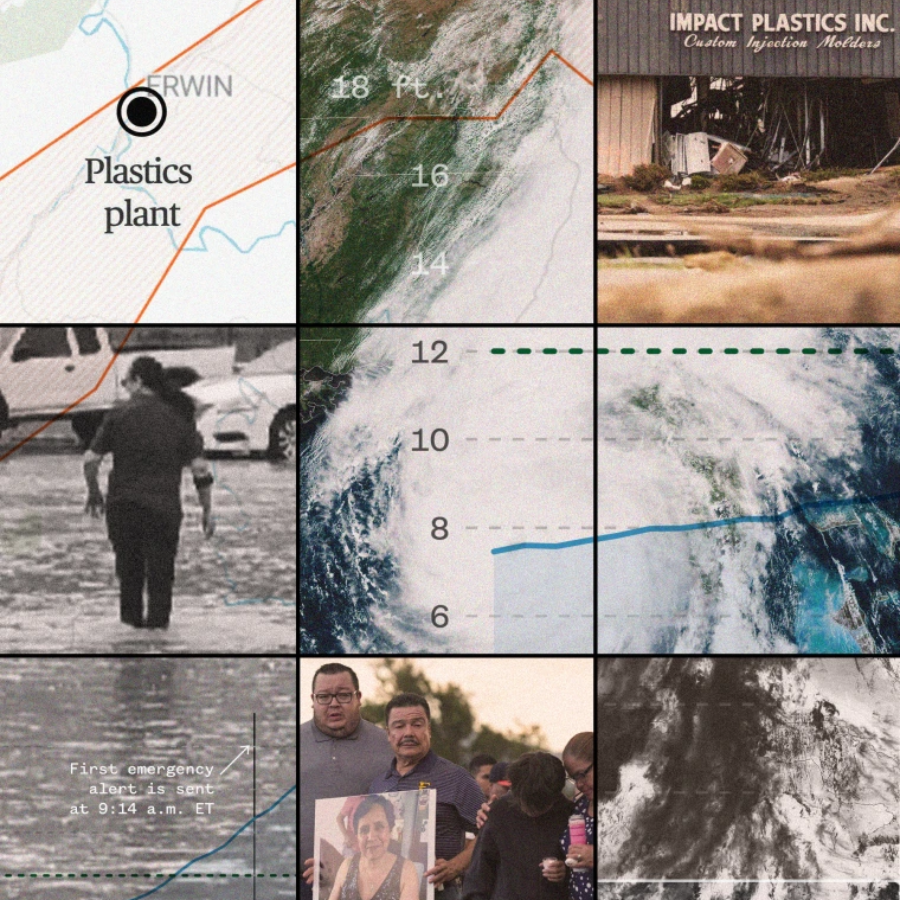
As Hurricane Helene unleashed an unprecedented amount of rain on East Tennessee, the rapidly rising Nolichucky River flooded a small plastics factory and cut off the only road leading out.
A group of workers, frightened and desperate, climbed into the trailer of a truck parked in front of the plant, but they were swept away by the surging waters.
In the days following the September 27 flood, the bodies of five Impact Plastics Inc. employees were found: Sibrina Barnett, 53; Monica Hernandez-Corona, 44; Bertha Mendoza, 56; Johnny Peterson, 55; and Lidia Verdugo Gastelum, 63.
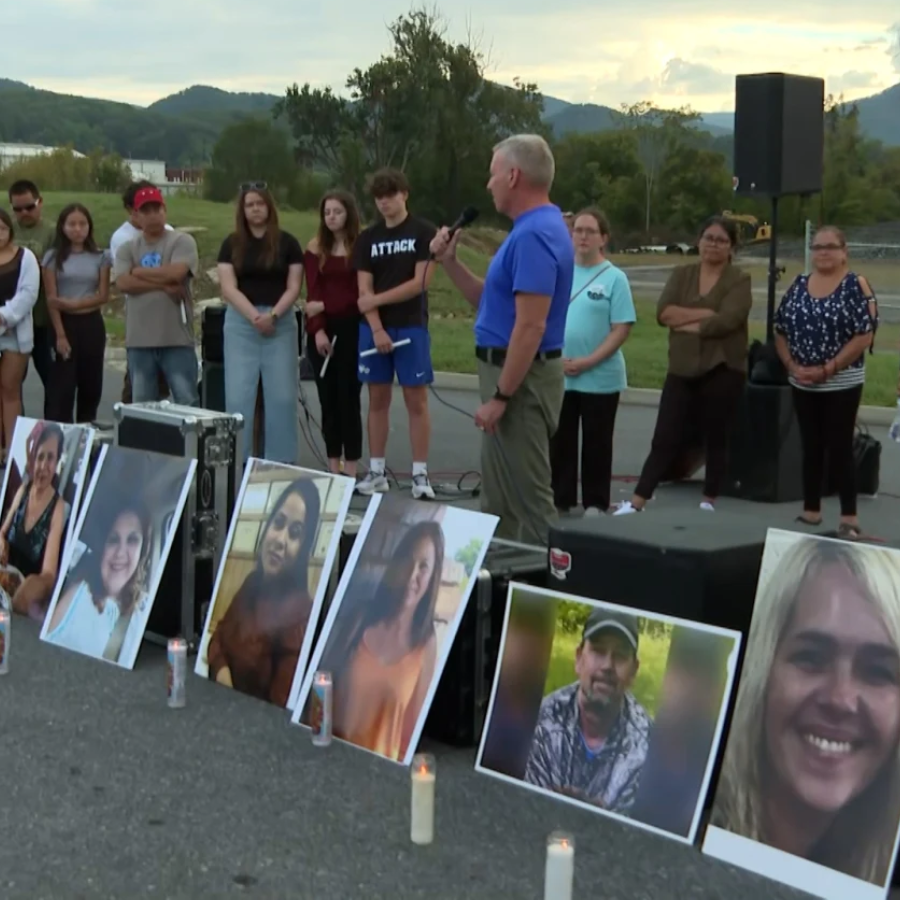
Authorities are still searching for a sixth worker, 29-year-old Rosa Maria Andrade Reynosa. Fortunately, five other workers who were on the trailer survived.
Michael Dorsey, the truck driver, explained that he and the others held tightly to the cargo in the trailer as the water levels rose. The trailer was a step-deck model, an open platform with a split level attached to the semi-truck.
However, large debris repeatedly struck the trailer, causing it to flip over and throw them into the fast-moving river, according to statements from both Impact Plastics and Dorsey.
The tragedy left a deep mark on the small Appalachian town of Erwin, home to around 6,000 people. Many relatives and local residents felt that the search efforts to find their missing loved ones were insufficient.
Emotions boiled over when a state official, in response to questions from the mostly Latino families of the victims, admitted that he was unaware of the presence of the town’s Latino community. Families were left grappling with one main question: how could this have happened?
“I just wish we never went to work that day,” said Robert “Robby” Jarvis, an employee of Impact Plastics. “Because it was unnecessary. All these lives we lost because of that. It was wrong.”
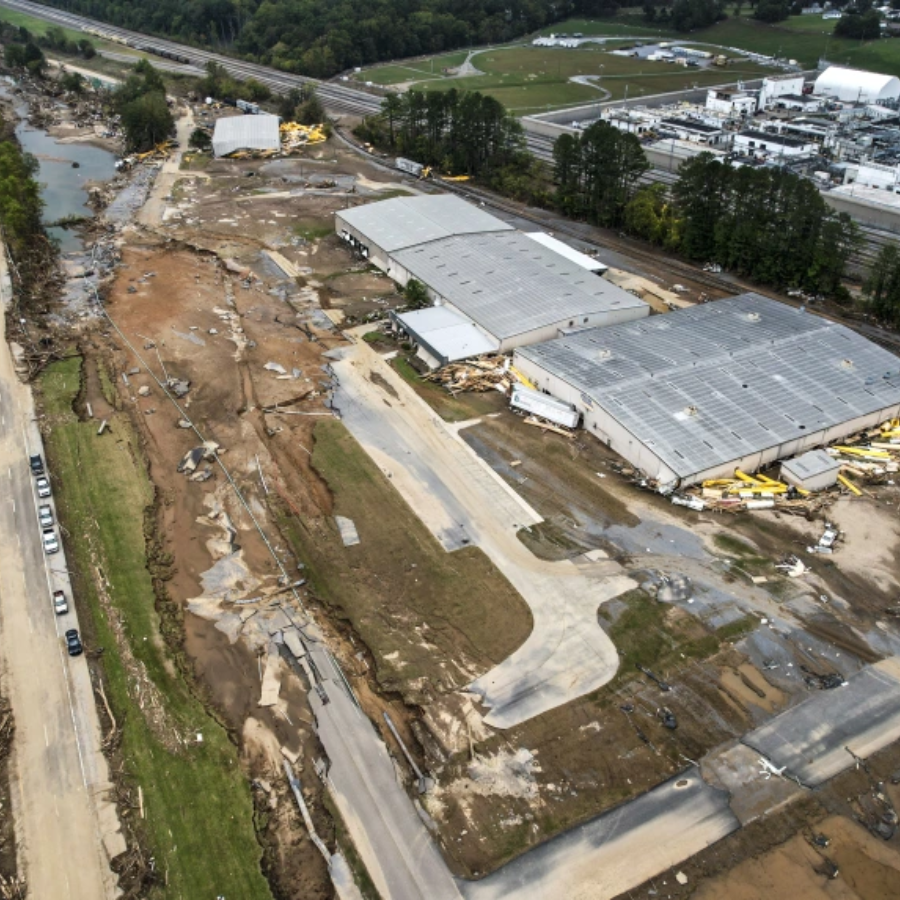
Gerald O’Connor, the owner of Impact Plastics, expressed his sorrow in a video statement. “We are heartbroken,” he said, mentioning that one of the victims was a longtime friend.
He also stated that employees were told to evacuate at least 45 minutes before the flood hit the industrial park. “There was time to escape,” he emphasized.
Along with the video, the company also released written statements, including a preliminary report claiming that an emergency evacuation plan had been in place long before the disaster.
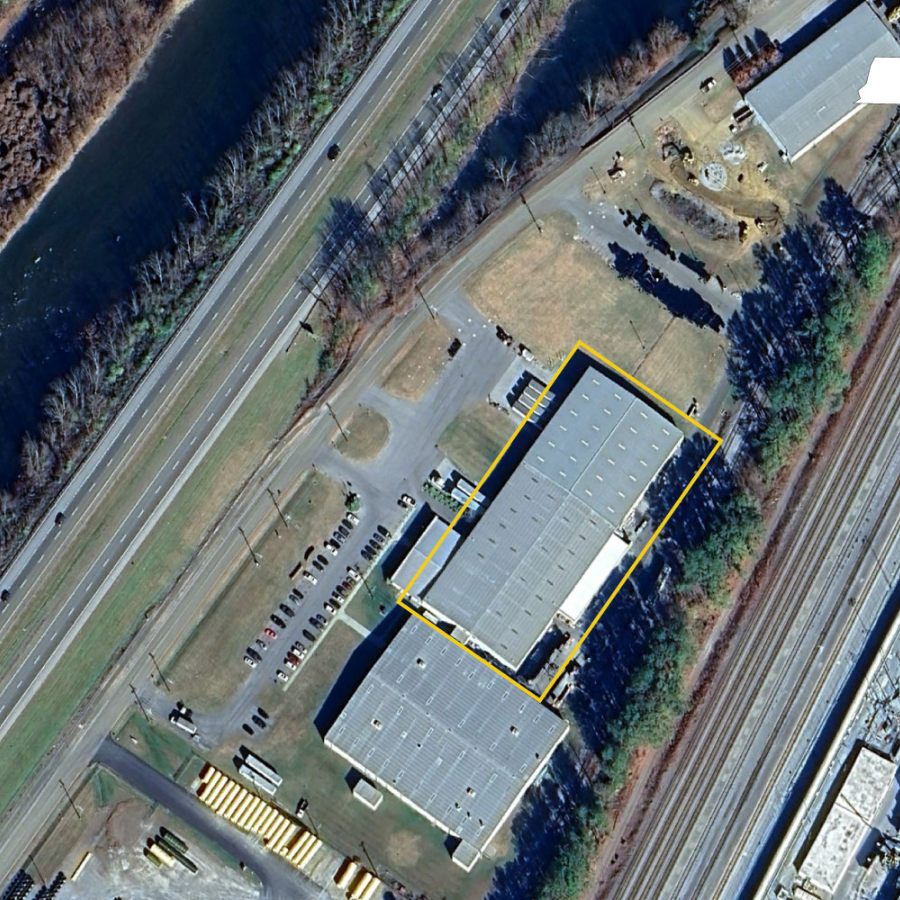
However, employees have disputed this, saying no such plan existed for flood emergencies.
Both the Tennessee Bureau of Investigation and the Tennessee Occupational Safety and Health Administration are currently investigating the circumstances surrounding the deaths of the Impact Plastics workers. O’Connor has declined further comment while the investigations are ongoing.
The families of the deceased, along with surviving employees, are also questioning why first responders didn’t reach their loved ones before the rising floodwaters overwhelmed them.
Many of the victims reportedly made phone calls to family members over an hour after leaving the factory’s flooded parking lot.
Just a mile and a half from the plant, about 60 people were rescued from the roof of Unicoi County Hospital in a perilous multi-agency airlift operation.
Officials stated that the hurricane’s impact on the Appalachian region was so unprecedented that there was little they could do to prepare in advance. “It’s hard to imagine preparation for something that’s never happened,” said Governor Bill Lee at a press briefing.
Friday, Sept. 27
- 7 a.m.
The day’s early shift began “as usual,” according to Impact Plastics in an Oct. 3 statement, adding that “there had been no flood alert or warning” at this point. This is despite the NWS warnings and school closings.
- 8:30 a.m.- 8:45 a.m.
An Impact Plastics worker, who did not want his name used for fear of retaliation from the company, started to see news on his phone of flooding in the area. Another Impact Plastics employee, Zinnia Adkins, started to get “messages, alerts” on her phone urging evacuation, she said. Fearful of water, she called her husband at 8:42 a.m., according to her call logs. She estimated about 25 to 30 employees were at the plant that day.
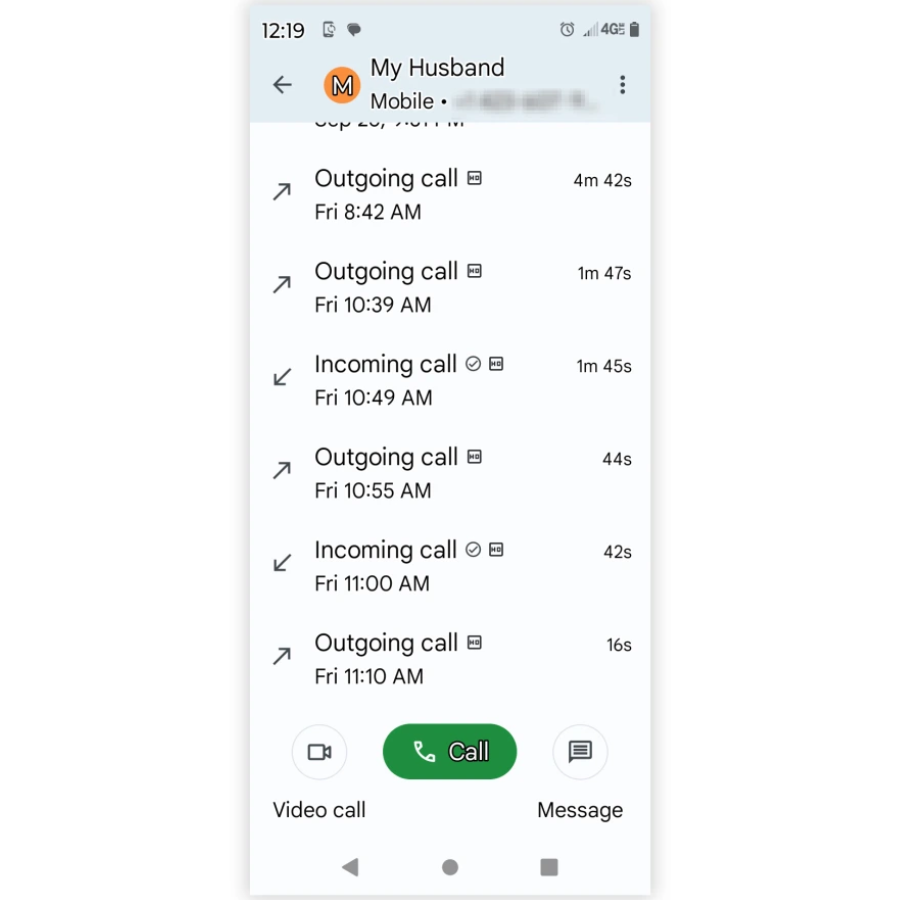
- 9 a.m.
Erick Castellón, an employee at Old Hickory Buildings, a storage shed builder less than a mile upriver from Impact Plastics, is dismissed for the day via a message from his boss telling all workers to leave, he said.
- 9:14 a.m.
The NWS sent its first wireless emergency alert in Erwin. The warning appeared as pop-up messages on phones receiving service from cell towers in the at-risk area. For phones with 4G service and above, it would have read: “A FLASH FLOOD WARNING is in effect for this area until 12:00 PM EDT. This is a dangerous and life-threatening situation. Do not attempt to travel unless you are fleeing an area subject to flooding or under an evacuation order.” Unicoi County Emergency Manager Jimmy Erwin told NBC News there had been no indication that cell phone towers were down that morning. Televisions and radios in the area would have received longer warnings. Impact Plastics employee Jackie Rangek was eating breakfast and noticed alerts on her phone around this time, she said. They frightened her and she consulted a co-worker, but neither knew what to do, so they returned to work.
The first alert
The National Weather Service sent an emergency alert to eastern Tennessee at 9:14 a.m. on Sept. 27. Records show the plastics plant was in the area that was alerted.
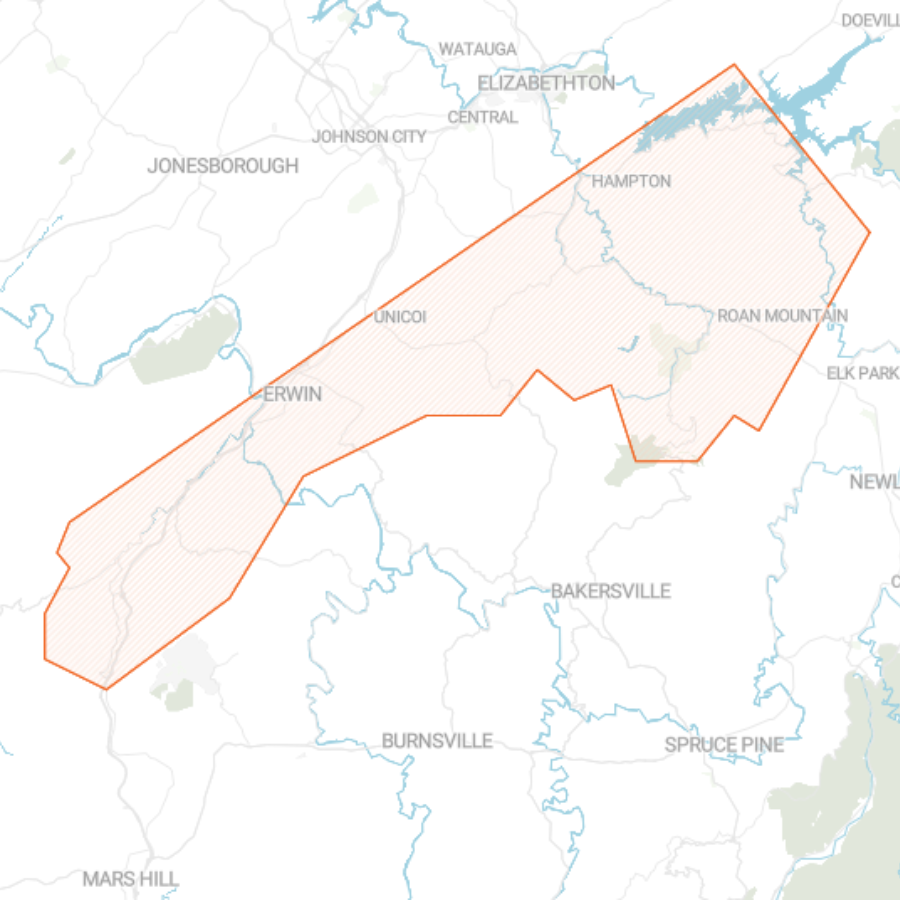
- 9:20 a.m.
The NWS sent another emergency alert to phones in the area, upgrading its “flash flood warning” to “flash flood emergency.” A “flash flood emergency” is a higher level alert issued for “exceedingly rare” situations when heavy rain is leading to a severe threat to human life resulting in rescues and evacuations and “catastrophic damage” is happening or will happen soon.
- 10 a.m.
Rangek recalled seeing another alert on her phone, but Impact Plastics employees continued working, she said. “We didn’t do anything then, again, because they didn’t tell us anything the first time,” Rangek said in Spanish.
- 10:30 a.m.
As businesses began to lose power, workers in a warehouse next to the Nolichucky River are moved by their employer, Nuclear Fuel Services, a fuel material manufacturer, to the company’s nearby main property that is at a higher elevation, according to an emailed statement from Chris Dumond, the parent company’s spokesman.
- 10:35 a.m.
Water began to pool in the Impact Plastics parking lot, according to the company’s publicly released preliminary review, which also stated the pooling is “not an unusual occurrence.”
- 10:39 a.m.
The power went out at Impact Plastics, according to the company.
- 10:40 a.m.
According to Impact Plastics, employees began receiving public warnings on their cell phones around this time. The company did not respond to questions about why their timeline of when public weather alerts were received differs from NWS records.
- 10:41-10:44 a.m.
On her lunch break, Adkins went outside and saw water accumulating in the parking lot. Adkins took multiple photos and a video showing the water in the parking lot. Jarvis, also outside, saw water in the parking lot at 10:44 a.m., he said.
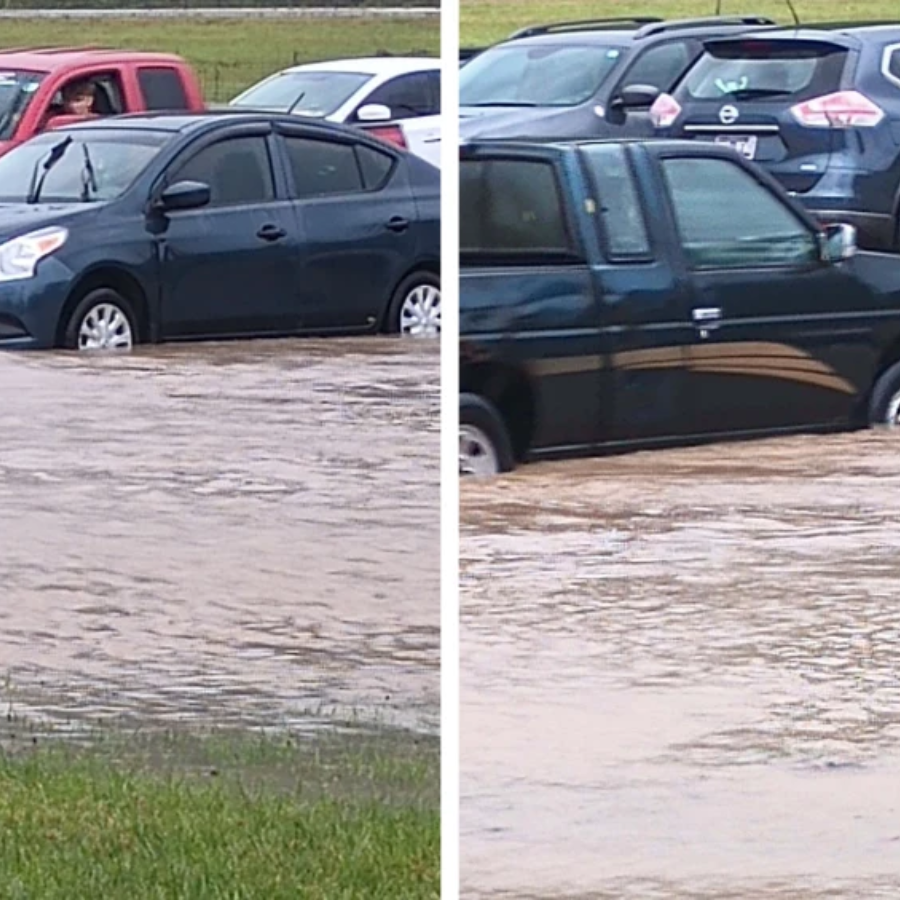
- 10:47 a.m.
Adkins took photos of Mendoza, who died in the flood, walking across the parking lot. Adkins also shot a video of the parking lot, saying: “We have no power at work. This is at Impact Plastics. This is the parking lot. Here are the cars. I mean, it’s flooded.”
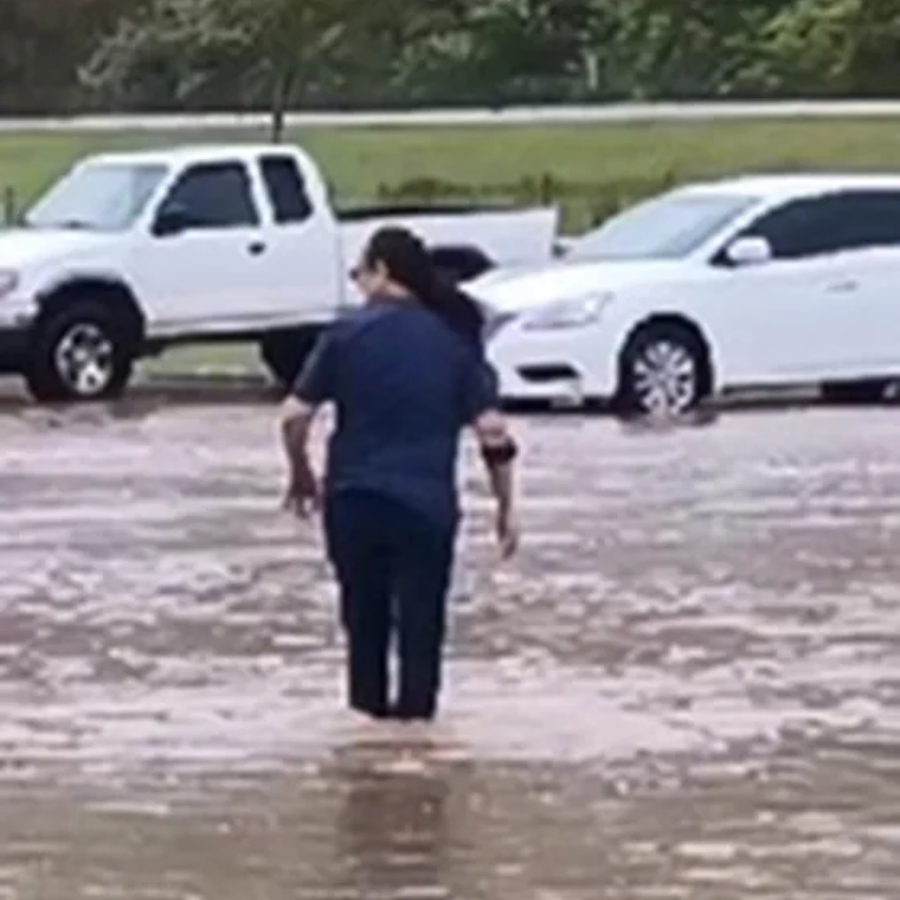
- 10:50a.m.
By this time, all employees had been told to leave, with bilingual employees translating the announcement in Spanish, according to Impact Plastics’ preliminary review. At this point, water pooling in the parking lot was only about 6 inches deep and South Industrial Drive — the primary road into and out of the plant — “appears to have been passable,” the company stated.
Peterson’s daughter Alexa texted her father at 10:51 a.m. and asked if they would shut down for the day, and he responded, “they better,” according to a lawsuit filed by Peterson’s family.
After the power outage, some of the employees present migrated to the break room. “Power went out in the plant, and at that point, most of the time, whenever we have a power outage, everyone migrates to the break room,” said Fred Hudgins, an Impact Plastics employee for more than two decades. Once employees noticed water flooding into the parking lot, people started moving their cars to higher ground, Hudgins said. Impact Plastics owner Gerald O’Connor said, “Let’s just shut it down,” according to Hudgins.
- 10:56 a.m.
Hernandez-Corona, one of the victims, responded to a message from her sisters on WhatsApp asking if she was OK and if she had gone to work that day. “Sí. We are. Flooding,” Hernandez-Corona wrote in three brief messages shared with NBC News by a family member. “My God,” one of the sisters responds.
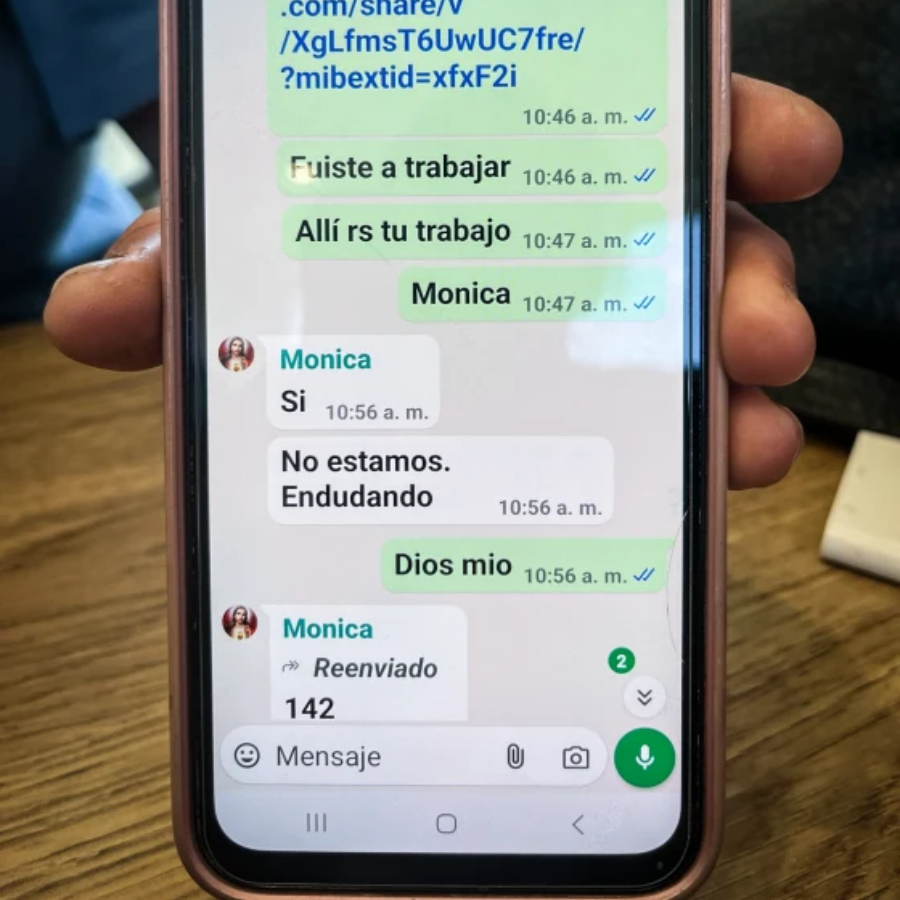
- 11 a.m.
Around this time, Dorsey, the truck driver, left Dura-line’s parking lot. He saw high water levels on the road and people still in the Impact Plastics parking lot, he said.
A woman, whom he was later told was Mendoza, knocked on the door of his truck, asking to get in to stay on higher ground. He said Mendoza and nine other people got into his truck and climbed aboard its trailer and started calling 911 and their loved ones.
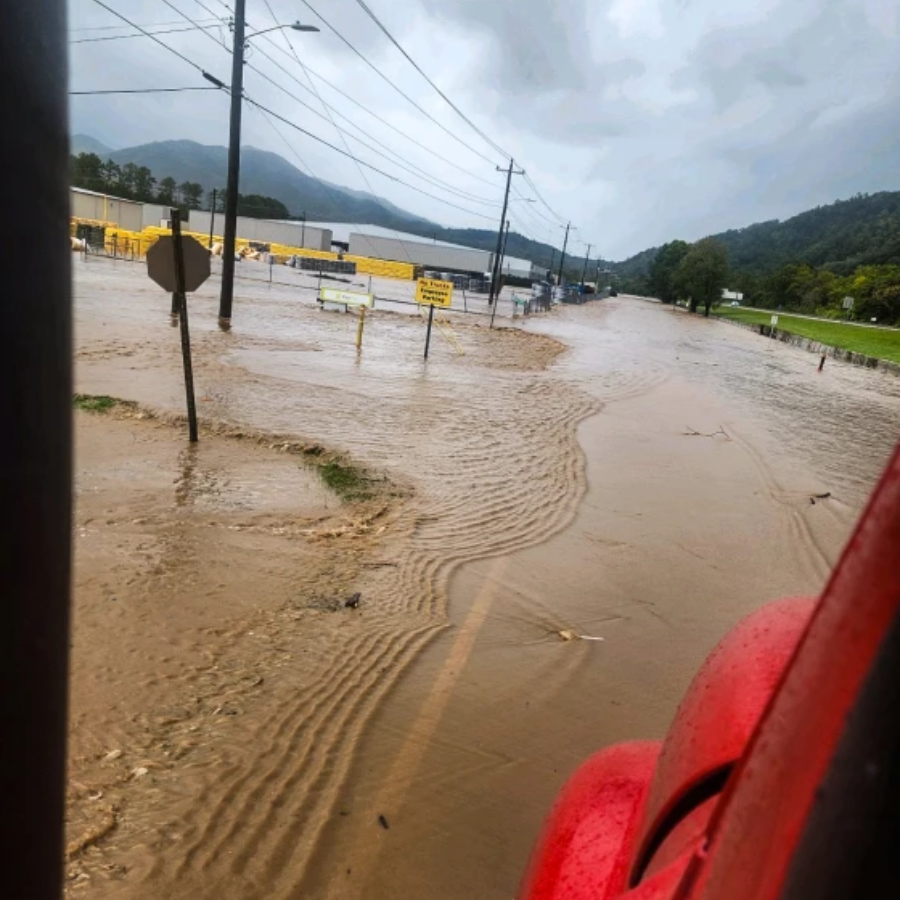
- 11 a.m.-11:30 a.m.
Rangek and another colleague decided to leave Impact Plastics since she had not heard any news or instructions from management, she said. She returned to get belongings and sees water inside the plant. Water had also risen in the parking lot. A colleague with a pickup truck agrees to drive her home along with two others, she said.
- Approximately 11:20 a.m.
Water started to fill the cab of Dorsey’s truck, forcing him and Mendoza to move to the attached trailer where other employees are perched. The truck eventually broke loose from the trailer.
- 11:23 a.m.
Peterson sent a photo to his daughter, Alexa, showing several inches of water inside Impact Plastics plant, according to WSMV in Nashville.
- 11:30 a.m.-noon
A manager at Impact Plastics told employees they could go, Adkins said. “I’m scared of water because I can’t swim real well, so a guy that worked there helped me across the parking lot,” Adkins said.
“Water was up underneath my arms” when she left, she said. “The road [to Impact Plastics] is a one-way road. You can’t get in and in or out if it’s blocked off. So we’re stranded there … nowhere to go.” Adkins described walking toward the northeast end of the industrial park at this point, in the hopes that her husband could drive down the interstate and come pick her up.
- 11:35 a.m.
Senior management attempted to move the company server and important documents, finished a final walkthrough of the plant and left, according to Impact Plastics’ preliminary review. These were the last individuals to leave the building, the review stated.
Their walkthrough took less than 10 minutes, and at that point, no one else was in the building, Hudgins said. They had to “make the owner leave,” he said.
Peterson, one of the victims, guided Hudgins and three other employees, including the chief financial officer and O’Connor, the owner, out a side door of the building and toward railroad tracks behind Impact Plastics, Hudgins said. Peterson went around to the front of the building to see if there was a way out, and got separated from Hudgins and O’Connor, Hudgins said.
Sometime later, a van from Nuclear Fuel Services rescued the group on the tracks after one of them made a call to a friend at the company, Hudgins said.
“When we got in the van, we were still trying to contact rescue people … ‘We still have people on the road. Can you please get somebody?’ We could see them from the railroad tracks,” he said. “And the water was just so high and rushing so rapidly that even an effort to try to get over to them, to lead them to where we were, was an impossibility.”
- 11:48 a.m.
The Erwin Police Department issued a state of emergency.
- 11:51 a.m.
A third NWS alert went out to cellphones across Erwin and other areas along the river, extending the flash flood emergency until 2 p.m.
- 12:08 p.m.
Mendoza sent her daughter Clarissa a video of flooding in the Impact Plastics parking lot. Clarissa offered to come meet her mother on the interstate, but Bertha told her that the water is rushing so rapidly that there is no way to get to the interstate, according to an attorney representing the Mendoza family.
- 12:32 p.m.
Hernandez-Corona sent a message to her sisters again on WhatsApp saying in Spanish: “I am okay. I am here on top of a trailer.”
- 12:48 p.m.
Hernandez-Corona sent a tearful audio message to her sisters, “Pray for us please” that was shared with NBC News by a family member.
- 12:52 p.m.
Hernandez-Corona sent another audio message to her sisters: “I’m here on a trailer but the water is about to get here. Please, God bless us. I don’t know what is going to happen. Take good care of my children.”
- 12:57 p.m.
Peterson sent a final video to his daughter of the turbulent waters surrounding him and other workers aboard Dorsey’s flatbed trailer, according to his daughter in an interview with WSMV in Nashville.
- 1 p.m.
Adkins called her husband for the last time before she meets up with him at the far side of the industrial park, according to her call logs. He used wire cutters to break through a barbed wire fence and then drove her home, she said.
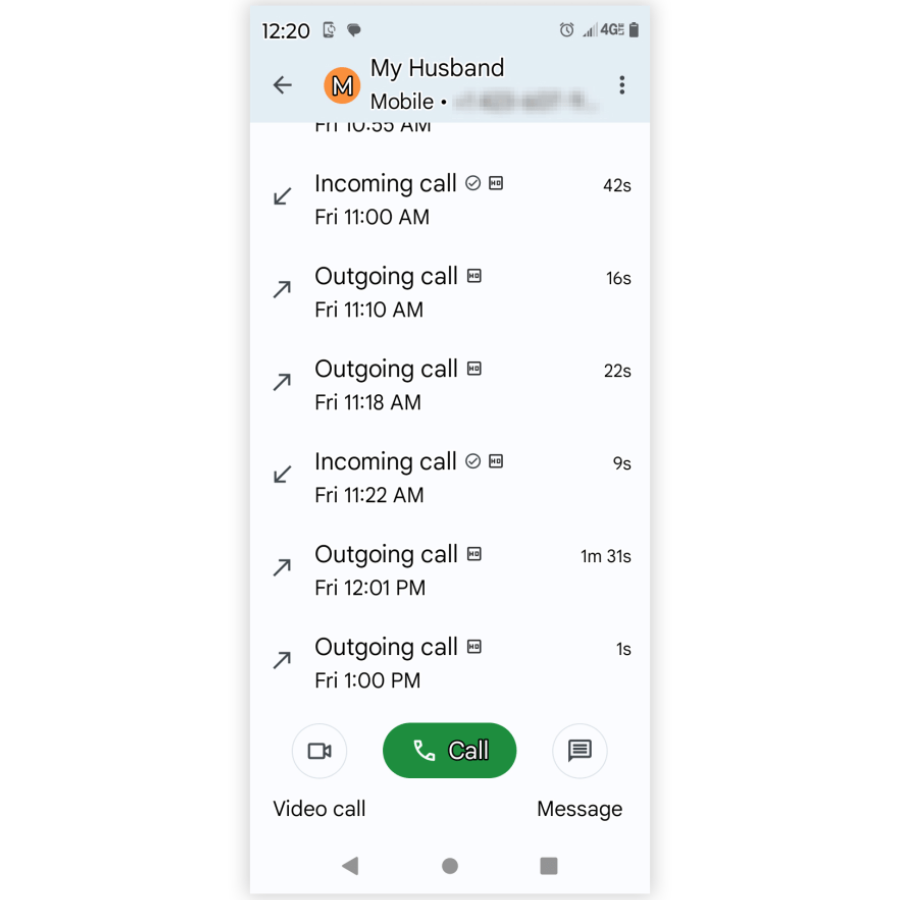
- 1:03 p.m.
Hernandez-Corona sent a desperate audio message in Spanish to her sisters: “Care for us. Protect each of my children, Lord. We are atop a trailer.”
- 1:28 p.m.
In her last audio message to her sisters, Hernandez-Corona said: “I’m still praying, Lord.”
Mendoza started calling family members to say goodbye, according to the family’s attorney. She told her daughter Clarissa that she loved her and to keep the stranded group in her prayers. She told her son Emanuel that this would be the last phone call because she needed to hold onto something for safety and her phone would get wet.
- 1:49 p.m.
Another NWS alert went out to cellphones at or near the plant, extending the flash flood emergency until 5 p.m.
- Time unknown
On the trailer and amid strong currents, “we hit a tree or something. We hit a tree, my trailer capsized, and everybody fell off the trailer,” Dorsey said in an interview with NBC News.
“And once we got inside of the water, I was trying to hold on to Ms. Bertha, but I got hit upside the head by something, and I got knocked unconscious,” Dorsey said. “When I came back to, I was looking for something to grab onto. … I ended up grabbing ahold to one of the tube things that fell off my truck.”
- 4-5 p.m.
Dorsey and the others who were able to grab onto the plastic pipes from his trailer float in the floodwaters until they wash up in a pile of debris pushed against trees and are able to stand, Dorsey said.
Sometime later, a National Guard helicopter rescued Dorsey and seven other people, he said. A fan boat had tried to reach them but the current was too strong, Dorsey said.
Week of Sept. 30
In an interview with NBC News four days later, Jarvis said of his lost co-workers: “The hardest part is knowing I’m here and they’re not. They should be here with me.”
Adkins and Jarvis survived the ordeal, but they say they can’t sleep. Dorsey, still in pain from the injuries he sustained that day, said that “mentally, I’m still messed up … that lady died,” referring to Mendoza.
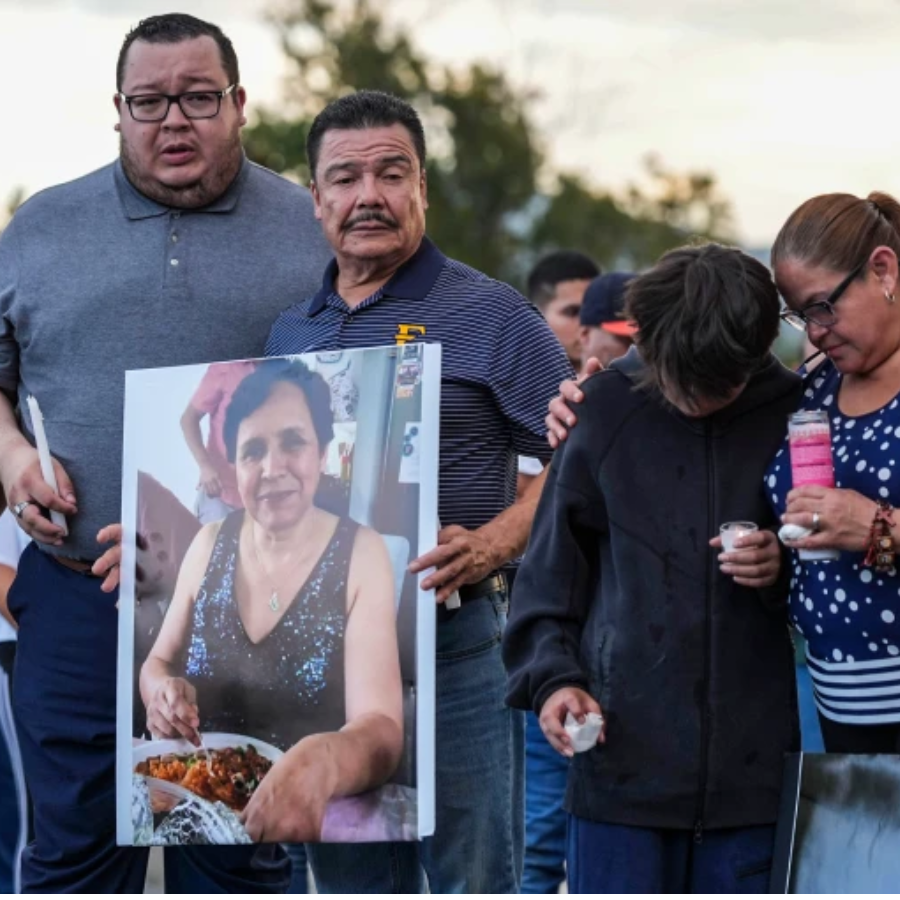
- Monday, Oct. 7
Preparing for Mendoza’s funeral, her husband Elías, accompanied by one of his sons, Guillermo, described how he had moved between the U.S. and Mexico as a guest worker for years, until he was able to get visas so he, his wife and their children could live permanently in the U.S. He would tell her that even if their children left to marry and live their own lives, “what I love the most is that I still have you.”
Since that Friday, Sept. 27, “the most difficult thing is to have to understand that she is not there,” said her husband of 38 years, “to cross that door and to understand that she’s no longer there.”
